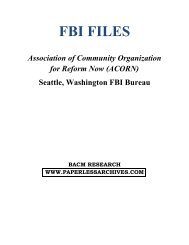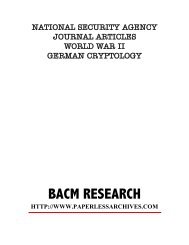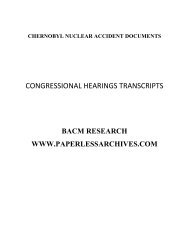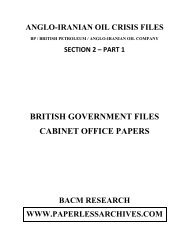Chernobyl Nuclear Power Plant CIA Files - Paperless Archives
Chernobyl Nuclear Power Plant CIA Files - Paperless Archives
Chernobyl Nuclear Power Plant CIA Files - Paperless Archives
You also want an ePaper? Increase the reach of your titles
YUMPU automatically turns print PDFs into web optimized ePapers that Google loves.
·'<br />
Seeret<br />
Reorganization qfthe <strong>Nuclear</strong> Industry<br />
Since the accident. the nuclear energy sector has<br />
undergone an extensive reorganization designed to<br />
make It more responsive to the concerns of safety.<br />
Currently. the ministries and Soviet organizations<br />
responsiblefor nuclear power in the USSRare as<br />
follows: (a) the Ministry af Atomic Energy (newly<br />
formed since July 1986 and headed by Nikolay<br />
Lukonin) assumed responsibility for operating all<br />
nuclear power plants. taking over some authority<br />
from other ministries: (b) the State Committee for<br />
Safety in the Atomic <strong>Power</strong> Industry: (c and d) the<br />
Ministry af <strong>Power</strong> and Electrification and the State<br />
Committee for the Utilization af Atomic Energywhich<br />
earlier controlled some plants but now have<br />
diminished authority: (e) the Ministry af Heavy <strong>Power</strong><br />
and Transport Machine Building-which combined<br />
the responsibilities af the now defunct Ministries<br />
af <strong>Power</strong> Machine Building and af Heavy and<br />
Transport Machine Building: (I) the Ministry af<br />
Medium Machine Building: (g) and the Ministry of<br />
Health-which will follow up on the radiation risks.<br />
Out af the previously existing bodies. the State<br />
Cbmmitteefor Sa/ety in the <strong>Nuclear</strong> <strong>Power</strong> Industry<br />
has undergmle the most significant changes. It has a<br />
new director. Vadim Malyshev, and a larger number<br />
affield engineers to conduct inspections since Chernoby/'.<br />
Its old director. Yevgeniy V. Kulov. was fired.<br />
The committee's power has been spelled out and<br />
includes the authority to stop an operation if a<br />
violation af regulations occurs. Whether this aut hority<br />
will be exercised is still an open question<br />
nuclear industry, which have been given a mandate to<br />
bring the Soviet reactors to more stringent safety<br />
standards<br />
A segment of the Soviet population-including some<br />
members of the elite with some policy influence-has<br />
much less confidence in the regime's capacity to<br />
guarantee safety. Another nuclear mishap, even a<br />
comparatively minor one, could unleash a backlash<br />
against nuclear energy and the regime that might be<br />
hard to ignore. Another accident would probably<br />
provoke public demonstrations of the sort increasingly<br />
used by independent groups as a platform for political<br />
and social issues.<br />
These demonstrations have already had some effect<br />
on regime policy and have sometimes taken on an<br />
anti-Russian cast. The actions of the growing environmental<br />
lobby-like the well-organized groups in Leningrad,<br />
which led a demonstration of 10,000 persons<br />
to successfully press for the closure of a chemical<br />
complex polluting the environment in Kirishi, or the<br />
public campaign in northern Georgia to halt the<br />
Trans-Caucasus railway planned to tunnel through<br />
the Caucasus Mountains-could serve as a model.<br />
The regime is not likely to maintain a business-asusual<br />
attitude the second time around, and major<br />
changes in the nuclear industry would have to be<br />
considered,<br />
Outlook<br />
Certain factors point to the potential for public<br />
opinions playing a greater role on nuclear power<br />
decisions in the future:<br />
• J'he democratization campaign unveiled by Gorbachev,<br />
Yakovlev, and other senior leaders presupposes<br />
more sensitivity to public opinion if it is to be<br />
taken seriously. Some informal environmental<br />
groups have apparently been able to get their candidates<br />
on the ballot in Leningrad, and the new law on<br />
public review of legislation provid,es for discussion of<br />
the construction of new enterpris~presumably<br />
including nuclear power plants-and environmental<br />
issues .<br />
• The views of some of the critics of nuclear power,<br />
like Boris Paton, a full member of the Central<br />
Committee, and some prominent journalists probably<br />
carry more clout under glasnost and have a<br />
better chance of keeping the pressure on the nuclear<br />
power industry.<br />
31
















